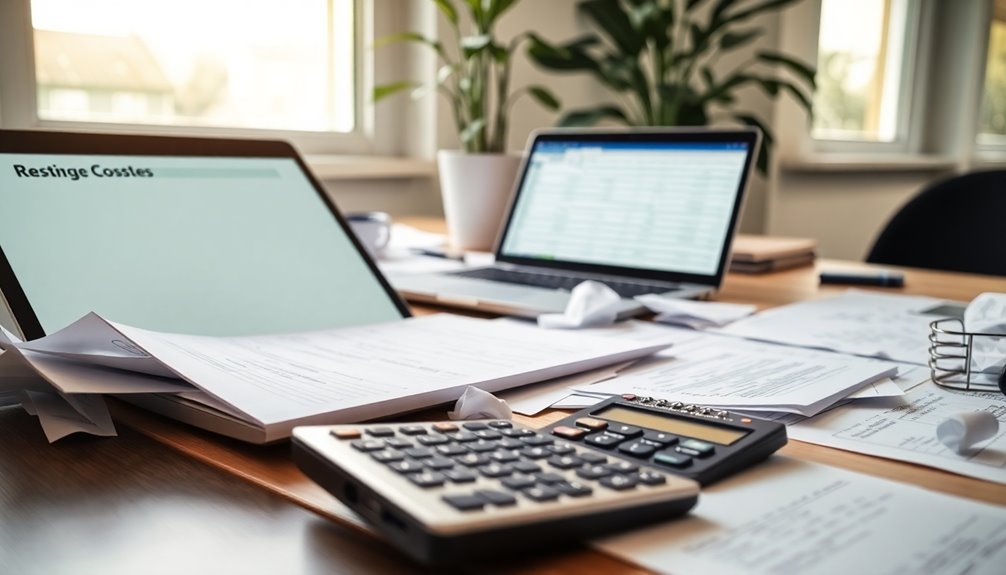Leasing as a sole proprietor can help you save on rent by allowing flexibility and minimizing upfront costs. You'll find that leasing often preserves cash flow for essential business expenses while providing access to prime locations without the burden of ownership. By maintaining a strong credit history and presenting solid financial documentation, you can increase your chances of securing favorable lease terms. Want to uncover more strategies for successful leasing? Keep exploring the insights available!
Understanding Sole Proprietorship Leasing Applications
When you're maneuvering sole proprietorship leasing applications, it's vital to understand how the IRS treats your rental arrangements.
The IRS views transactions between your sole proprietorship and you as cash movement, meaning you can't deduct rental expenses on Schedule C. For tax purposes, you can still claim mortgage interest, utilities, and other building-related expenses on your personal tax returns. Additionally, establishing clear payment terms can enhance your understanding of rental obligations and improve your financial management. Utilizing expense management apps can also help you track and categorize your expenses efficiently.
If you're leasing to a multi-member LLC or partnership, make certain to charge fair market rent to avoid having payments recharacterized as guaranteed payments.
Maintaining proper documentation of all lease agreements and related expenses is important to substantiate claims during tax filings. Careful structuring of your lease can help align with your tax goals and guarantee compliance with IRS regulations. Additionally, leveraging expense categorization can improve your financial reporting and help you identify potential cost-saving opportunities.
Benefits of Leasing for Sole Proprietors
Leasing offers you a cost-effective way to secure space for your business without the hefty upfront costs of buying property.
With flexible options, you can easily adjust your space as your business needs change, whether you're scaling up or down. This adaptability makes leasing a smart choice for managing your sole proprietorship's growth. Additionally, engaging in loyalty programs can enhance customer relationships and drive repeat purchases, further supporting your business's financial stability. Regular expense tracking is also crucial for maintaining financial discipline, ensuring that your leasing expenses align with your overall financial goals. Moreover, using budget apps can provide valuable insights into your spending habits, helping you make informed decisions regarding your leasing costs.
Cost-Effective Business Solutions
For many sole proprietors, leasing commercial property offers a smart way to manage finances while growing a business. By entering a lease agreement, you can preserve cash flow, allowing you to allocate funds toward essential business expenses instead of facing large upfront costs.
Leasing usually requires a lower initial investment, and many landlords provide flexible payment terms to suit your financial situation. This cost-effective solution can also give you access to prime locations, enhancing your visibility without the burden of ownership.
Plus, many rental agreements shift maintenance responsibilities to the landlord, freeing you to focus on growth. Finally, leasing allows you to adapt to changing business needs easily, whether upgrading or relocating as necessary.
Flexible Space Options
Choosing the right space can be a game changer for sole proprietors looking to maximize their business potential. By opting for flexible space options, you can notably reduce overhead costs.
With short-term leases, you avoid long-term commitments, allowing you to adjust based on your business's growth and demand. This flexibility enables you to convert large upfront property costs into manageable monthly rental payments, improving your cash flow management.
Additionally, many leasing agreements come with inclusive amenities like utilities and internet, simplifying your budgeting. These spaces often provide professional environments that enhance your credibility and open up valuable networking opportunities, essential for the growth of your sole proprietorship.
Embrace flexibility and watch your business thrive!
Factors Landlords Consider for Sole Proprietors

When applying for a lease, it's important to understand the key factors landlords consider for sole proprietors. One major aspect is your credit history; a strong score can greatly boost your leasing chances.
Landlords often require at least two years of tax returns and profit and loss statements, offering insights into your business's financial health. Demonstrating consistent income through multiple income streams and maintaining a low debt-to-income ratio can also enhance your application. Utilizing expense tracking apps can help provide detailed insights into your business's financial performance, making it easier to present your case. Additionally, using budgeting and expense tracking tools can help you maintain organized records of your business's financial activities.
Additionally, personal financial statements are essential as they showcase your financial stability and cash flow, which landlords scrutinize closely.
Finally, providing references from previous landlords helps establish your reliability in meeting rental obligations, further strengthening your position as a potential tenant. Moreover, utilizing expense tracking tools can provide financial clarity by ensuring that all your business expenses are accurately documented and easily accessible for your application.
Streamlined Application Process for Sole Proprietors
Understanding the factors that landlords consider is just the start; streamlining your leasing application process can make a significant difference in securing a lease as a sole proprietor.
Begin by compiling a thorough package that includes at least two years of tax returns and profit and loss statements to showcase your financial stability. Maintaining a strong credit score and reducing outstanding debts to improve your debt-to-income ratio is essential for demonstrating financial organization in your application. Using effective budgeting tools, such as expense tracking features, can further enhance your financial presentation.
A well-crafted cover letter explaining your business model and financial reliability can help landlords see your potential. Additionally, providing references from previous landlords and a history of on-time rent payments can strengthen your leasing application.
Networking within community groups or utilizing rental agents familiar with self-employment challenges can also lead to better opportunities. Furthermore, understanding financial health is crucial for demonstrating your ability to manage rent alongside other expenses.
Negotiating Favorable Lease Terms

Negotiating favorable lease terms can greatly impact your business's financial health, so it's essential to approach discussions with confidence and preparation.
Start by researching comparable rental prices in your area; this data will help you make a solid case for lower rent based on market conditions. Additionally, consider how your negotiation aligns with ethical business practices that support a fair economy. Utilizing price comparison tools can also help in assessing reasonable rental prices.
As a business owner, consider offering to sign a longer lease term in exchange for reduced monthly rent, as landlords prefer stability. You might also propose a graduated rent structure to ease initial cash flow challenges.
Highlight your financial stability and strong credit history to reassure landlords of your reliability.
Don't hesitate to ask for additional concessions, like reduced security deposits or allowances for property improvements, to enhance your overall rental arrangement. Additionally, leveraging personalized communication can strengthen your negotiation position by demonstrating your commitment to a mutually beneficial agreement.
Tax Implications of Leasing for Sole Proprietors
Leasing a property as a sole proprietor can come with unique tax implications that you need to navigate carefully. The IRS treats you and your business as the same entity, meaning you can't deduct rental expenses on Schedule C. However, you can still deduct legitimate business expenses, like utilities and maintenance. To maximize benefits, consider restructuring your business as an LLC, which may allow for different tax treatment.
| Deduction Type | Applicable? | Notes |
|---|---|---|
| Rental Expenses | No | Not deductible as a business |
| Mortgage Interest | Yes | Deductible on personal Schedule A |
| Utilities | Yes | Deductible as legitimate business expenses |
| Maintenance Costs | Yes | Deductible as legitimate business expenses |
| LLC Structure Benefits | Potentially | Different tax treatment and deductions possible |
Common Mistakes to Avoid in Leasing Applications

When applying for a lease as a sole proprietor, it's easy to overlook essential details that can jeopardize your chances of approval. One common mistake is failing to provide complete financial documentation, like tax returns and profit and loss statements. This can lead to denial or unfavorable lease terms.
Don't neglect your credit history; highlighting your financial stability is vital for a favorable lease agreement.
Also, understand the importance of rental references; positive feedback from previous landlords can enhance your credibility.
Make certain to clearly explain your business's nature and stability in your cover letter to avoid misunderstandings about your business viability.
Finally, guarantee your rental application is professional and detailed, as landlords prefer thorough submissions.
Tips for Successful Leasing Agreements
When it comes to successful leasing agreements, understanding the lease terms is essential.
You should always negotiate rental rates to secure the best deal possible.
Plus, maintaining accurate documentation will help you stay organized and avoid disputes down the line.
Understand Lease Terms
Understanding lease terms is essential for ensuring a smooth leasing experience, as it helps you avoid unexpected surprises down the line. Start by carefully reviewing the lease agreement to know the rent amount, payment schedule, duration, and renewal options. This clarity will prevent future confusion.
Be sure to specify responsibilities for maintenance and repairs, as unclear terms can lead to unexpected costs. Additionally, look for provisions regarding rent increases, such as caps on annual hikes, to better manage future expenses.
Retain a copy of your lease agreement and all correspondence with the landlord, as this documentation is vital for resolving disputes and for tax purposes. Taking these steps will empower you in your leasing journey.
Negotiate Rental Rates
Negotiating rental rates can greatly impact your business's bottom line, especially in a competitive market.
Start by researching comparable rates in your area to guarantee you're not overpaying. Use your rental history and financial stability to showcase your value to landlords.
Offering a longer lease term can also be beneficial; many landlords prefer stable, consistent income and might agree to lower rates in exchange.
Be flexible with lease terms, such as accepting minor renovations, to make your proposal more appealing.
Finally, leverage the current economic climate to negotiate lower rates or additional concessions, as many landlords are keen to fill vacancies.
Maintain Accurate Documentation
To guarantee a smooth leasing experience and maximize deductions for your sole proprietorship, it's crucial to maintain accurate documentation.
Start by keeping a copy of your lease agreement, ensuring it reflects fair market value to avoid IRS reclassification as personal expenses. Document all rental payments and maintain detailed business use logs to substantiate your deductions, reducing the risk of IRS audits.
Additionally, be diligent in noting any changes in property usage or rental terms to comply with IRS regulations. Meticulous financial records, including tax returns and profit and loss statements, will strengthen your application for leasing agreements.
Building a Strong Relationship With Landlords

Building a strong relationship with your landlord is essential for creating a positive leasing experience. Start by establishing open communication to build rapport and foster trust. This clear dialogue helps both parties understand each other's needs, often leading to more favorable lease terms.
Show you're a reliable tenant by making timely rent payments and maintaining the property, which encourages your landlord to negotiate better agreements. Presenting solid financial documentation demonstrates your commitment and stability, reinforcing your image as a trustworthy tenant.
Regular check-ins can proactively address concerns, ensuring a smooth leasing experience and potentially longer lease durations. By showing appreciation for your landlord's property, you increase the likelihood of receiving favorable treatment in future negotiations.
Conclusion
In the world of sole proprietorship, leasing doesn't have to feel like a tightrope walk. By understanding the application process and negotiating favorable terms, you can save on rent while securing a space that fits your needs. Avoid common pitfalls, and build a solid relationship with your landlord to create a win-win situation. Remember, a well-planned lease is the foundation for your business's growth, so take the leap and watch your venture flourish!



